|
by Barbara Marlow Irwin |
|
In celebration of my birthday, I collect post cards of children winding the Maypole. Here are some examples.
|
|
|
|
|
|
|
|
|
|
|
|
|
|
|
|
|
|
|
|
|
|
|
|
|
|
|
|
|
|
|
by Barbara Marlow Irwin |
|
In celebration of my birthday, I collect post cards of children winding the Maypole. Here are some examples.
|
|
|
|
|
|
|
|
|
|
|
|
|
|
|
|
|
|
|
|
|
|
|
|
|
|
|
|
|
|
I became interested in Maypoles because I remember May Day and Maypoles as a celebration for my birthday, May 1st. As a young child I really thought that was why we were celebrating! I remember that the pole was in the school yard and the colorful crepe paper ribbons were attached to the top. The boys would have a ribbon and walk to the right, the girls would take a ribbon and walk left. The boys and girls would walk in opposite directions holding the ribbons taut. As the children met, we would alternate by going under the ribbon of the first boy then go over the ribbon of the next boy (the boys would reverse the pattern) and so on. This up and down or in and out movement would create a weaving pattern (tabby weave) down the pole as the ribbons got shorter and shorter. I'm not positive, but I think there was an odd number of either boys or an odd number of girls in order to create the weave. It was almost like a dance because we moved to music. The winding of the Maypole was a traditional activity every year that the whole school participated in to welcome spring. Also, when I was young we made May baskets out of squares cut from left over wall paper--rolling them into cone shapes, adding a handle, then filling the baskets with handpicked flowers. That evening we would hang them on our friends' doors (usually older seniors), ring the door bell or knock, then run and hide and watch them find the flowers from our hiding places. I have very fond childhood memories of May Day.
Below, my husband surprised me with some wonderful May Day cards that he found in California. They give some other ideas for May Day. Enjoy.
|
|
|
|
|
|
|
The Garland Dance is another old English Dance tradition. Rebecca Suerdieck has a web site about Garland Dancing and she can give you more information if you are interested. The Maypole is in the center. |
|
|
|
This is the same group of young ladies as the hoop dance. I would say that these young ladies must have gotten confused because of the mess of ribbons. Note: A visitor to the web site wrote: "the dance that these ladies have just danced is known as gypsies tent. The ribbons have slipped so it does look a mess. The right hand side is ok." |
|
|
|
1920 May Fete at Lowell Seminary. Although at a Seminary, this view infers some of the pagan influence of May Day. |
|
|
|
|
|
|
|
|
|
|
|
|
|
|
|
|
|
|
|
|
|
|
|
|
|
|
|
|
Below are some assorted Mayday scenes that are a bit unusual.
|
|
Another Garland Dance scene. This scan is a bit light but it shows more hoops with flowers on them. |
|
|
This is apparently a piece of playground equipment called the May Pole from Lancaster Park in Jackson, Tennessee. I assume the girls are swinging from chains since their feet are off the ground. |
|
|
A very traditional American Maypole. |
|
|
A nice scan showing older ladies with a Maypole. See below for a closer view. |
|
|
Enlargement of above. Notice lady in a wheelchair, the May queen and a drummer. We wonder if this photo was taken at some kind of hospital or sanitarium. |
|
|
This card is labeled May Day, but we don't see a pole. This view is unusual in that boys are participating. See below to see a close-up. |
|
|
Close-up showing the queen. Also note the piano on the right. |
|
|
A nice colored card. Notice the colored paper on the ground. |
|
|
Quite a crowd. Again, we wonder if this is a hospital / sanitarium scene. |
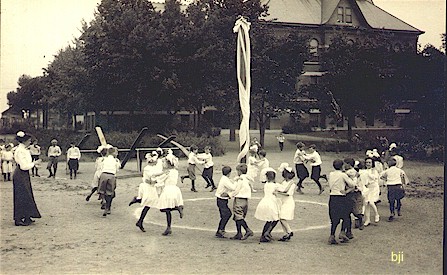 |
Don't know if this was before or after the MayPole dance. |
|
Please note: Barbara J. Marlow Irwin passed away very unexpectedly August 21, 2009. I am her husband, Lyndon Irwin, I can't answer questions about music, maypole dances or much else. However, I wanted to leave this page up as a memorial to her. |
Below are two photos of her grave stone on her birthday, May 1, 2010. As you can see, we decorated the grave with maypoles. I know that it would have pleased her. Lyndon |
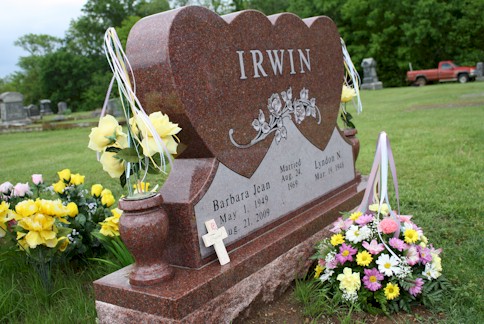
Worsley Cemetery, Bronaugh, Missouri |
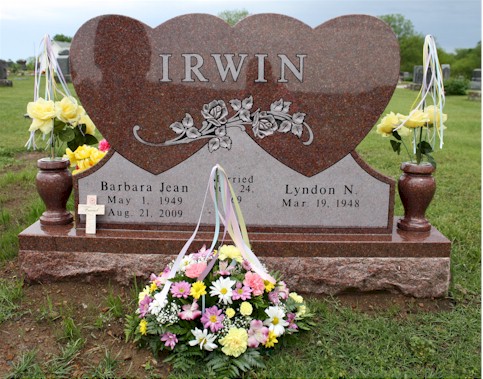 |
Frequent question:
The most common question that we get is what music is used. Rebecca Suerdieck has provided more definitive information:
Written by Rebecca Suerdieck, with suggestions made by Tony Barrand of
Boston University and Andy Davis of the New England Dancing
Masters. There is no specific music for dancing
around a Maypole. Traditionally, Maypole dances in England
were led by Morris (and Garland) dancers. Morris musicians
played the tunes they knew. Each village had its own
dance(s), with regional variations. When planning a Maypole Dance at a modern
day event, you could use any kind of English folk music or
Morris tune. For ease of accessibility, check your local
public library for recordings of English folk tunes or
Morris Tunes, Celtic/ Irish folk music, anything with a
fiddle, pipe & tabor, accordion or
concertina. Jigs are good for fast walking or
skipping steps. Marches and Reels are good for walking
steps. Waltzes are good for more graceful walking, or steps
like "1-2-3, pause-2-3." Here are a few resources for traditional
English and Anglo-American music. Each sells recordings of
dance-length music. Contact them directly for more
information. http://www.dancingmasters.com/ Also, you might want to try recordings of
music by Classical composer Percy Grainger. He researched
English folk tunes and made recordings of his adaptations.
Look for song titles like "Country Gardens," or "Shepherd's
Hey." Note: these song lengths may be too short for dancing.
You may have to rewind/replay each song to keep hearing the
same song. If authentic English folk music is
unavailable, try to find simple melodies without words. I've
heard that some people use polka music, which has an upbeat
tempo. You could also use Celtic/ Irish fiddle music,
traditional Appalachian/ Bluegrass instrumental music, or
even Tudor/Elizabethan music. Look for songs with tempos
that work for your group. Recommended tempo is about 110
beats per minute on a metronome. For musicians looking for sheet music
that would be appropriate for dancing around a Maypole, go
to the following website and follow the instructions to
download music. http://www.ucolick.org/~sla/morris/music/abclib.html To see online video footage of Maypole
Dancing, go to the following website and search
"maypole." For kits to make your own Maypole, go
to: I hope this helps. Feel free contact me
and this was helpful to you. If you find something that
worked well for your event, please let me know and I will be
glad to include it on this list. Enjoy your Maypole Dance! With bells on, Rebecca Suerdieck
The two photos above refer to the Ivy Day Procession and
Maypole Dance. There is obviously a Maypole but the date
seems to be May 17. The photo to the left appears to be at the same place
since the building in the background is the same but it is
perhaps from a different year. It is labeled "Scrambling for
Souvenirs, Ivy Day". The date is not readable. But you can
see that after the Pole had been wound, young men were
rushing in to get souvenirs - whatever they were.
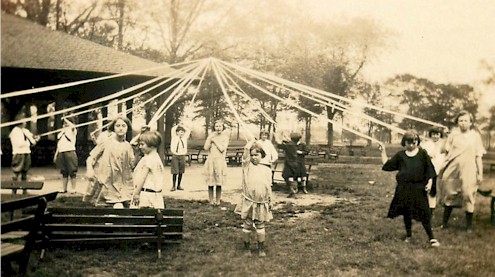
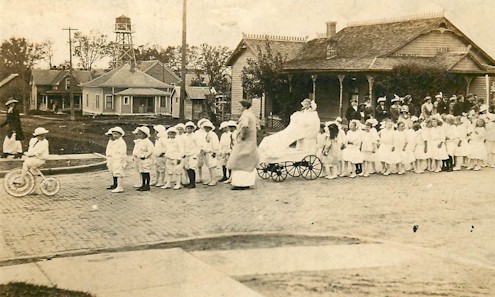
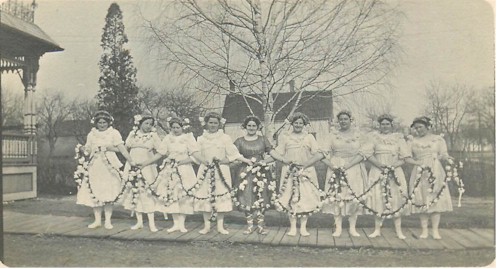
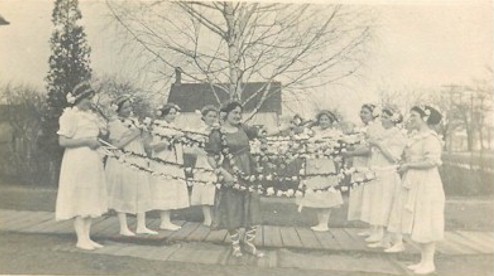
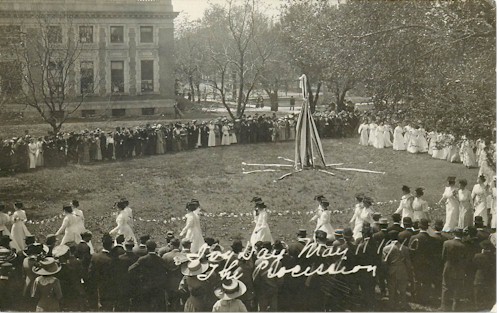
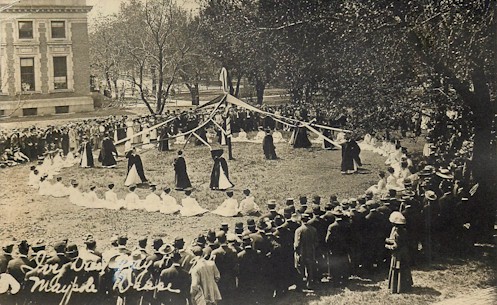
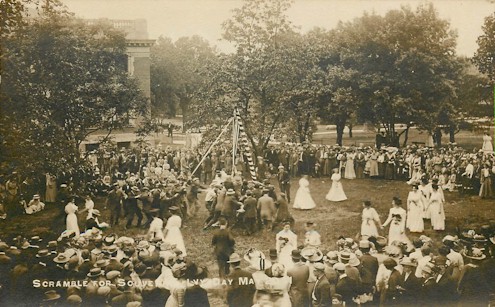
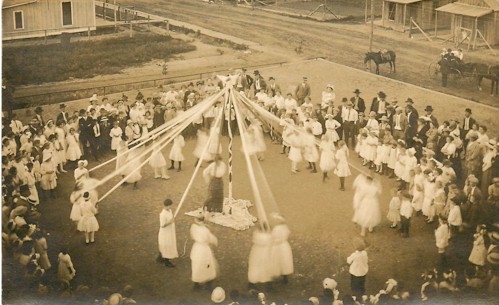
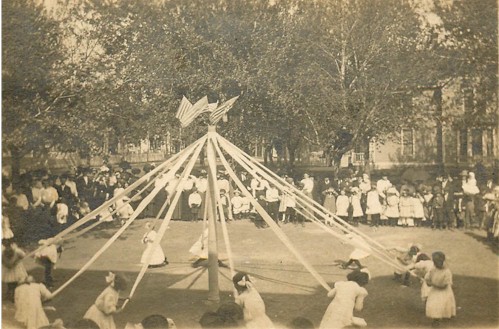
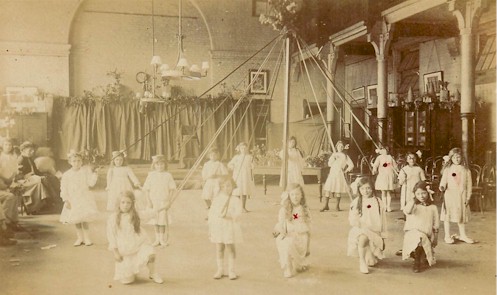
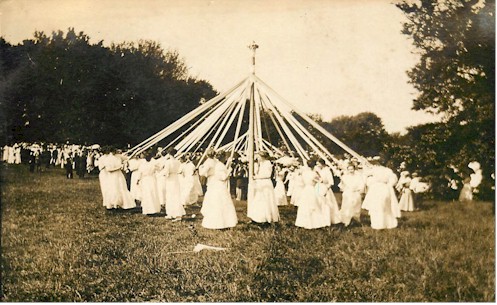
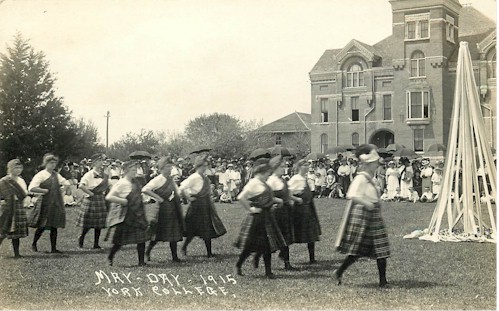
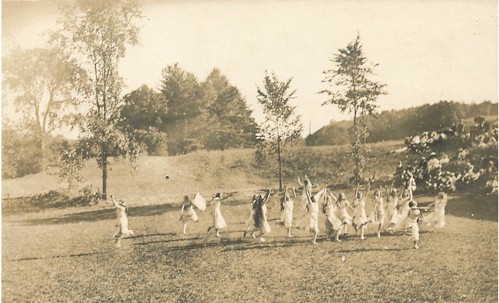
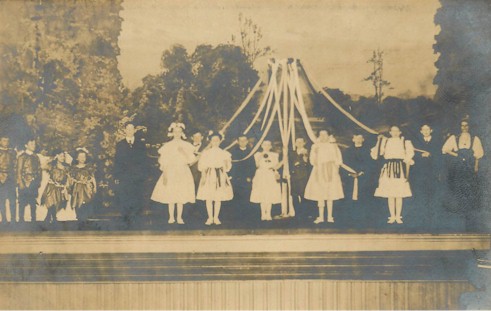
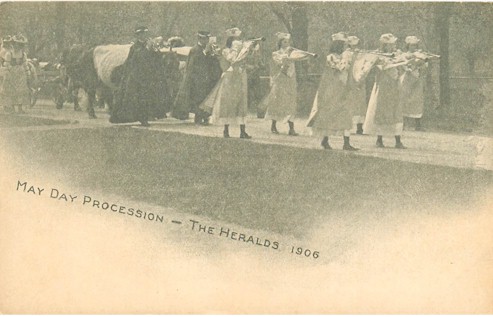
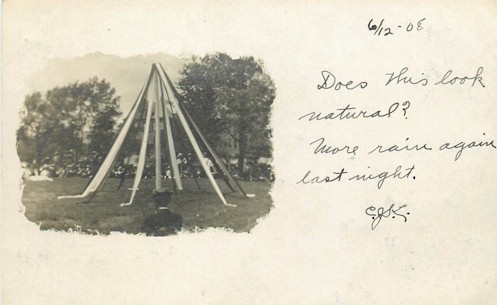
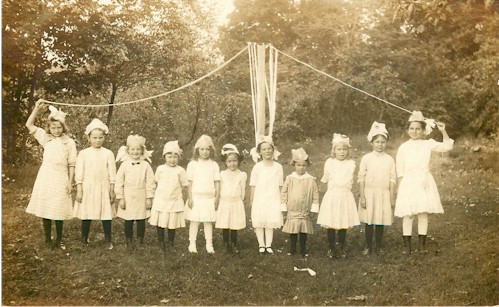
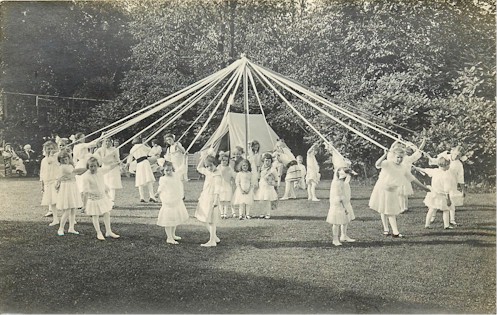
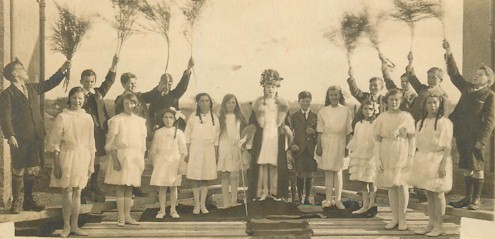
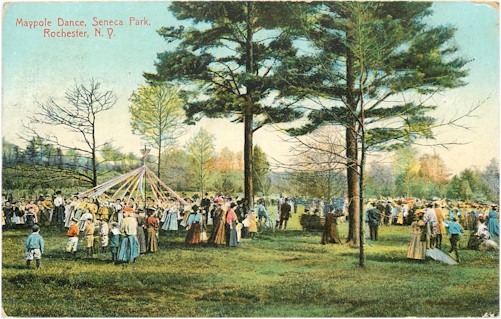
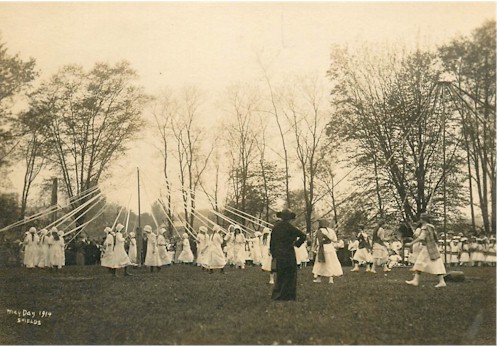
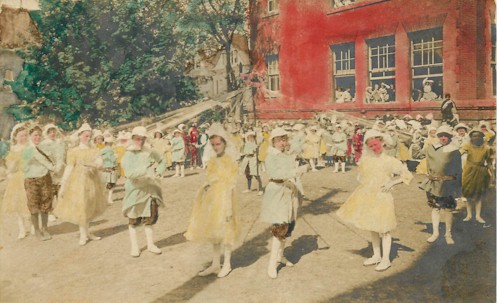
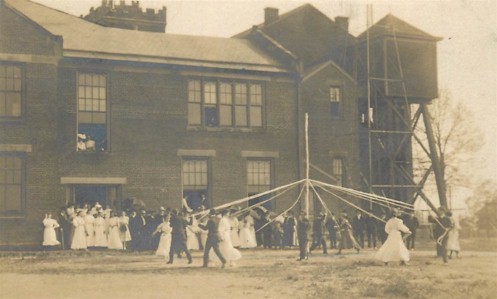
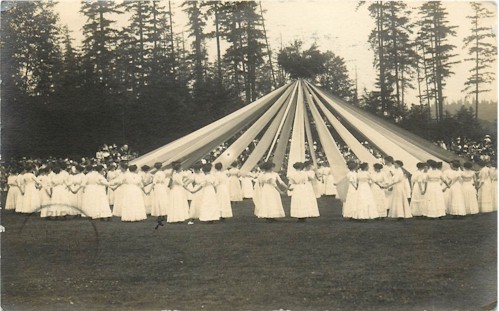
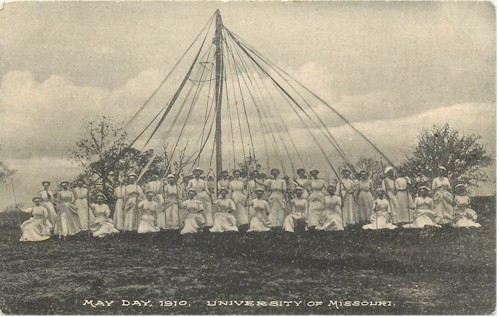
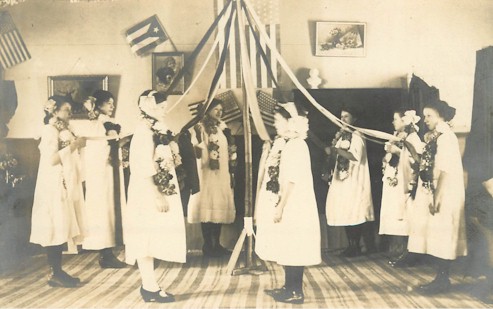
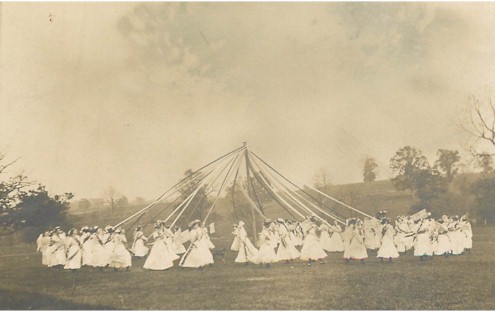
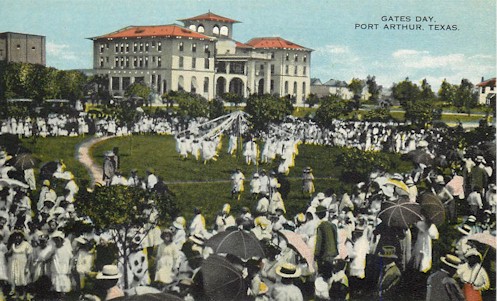
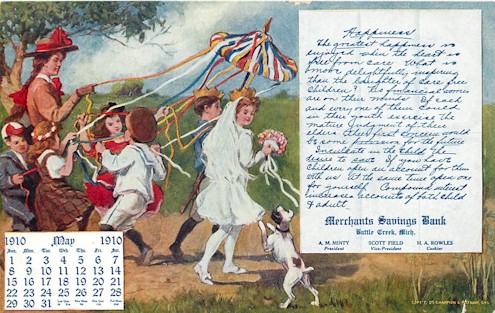
View a Maypole Stereoview with History
Click here to see a close-up view of a Maypole.
Go back to my Home Page
This page was designed, maintained and copyrighted by Barbara Jean Marlow Irwin.